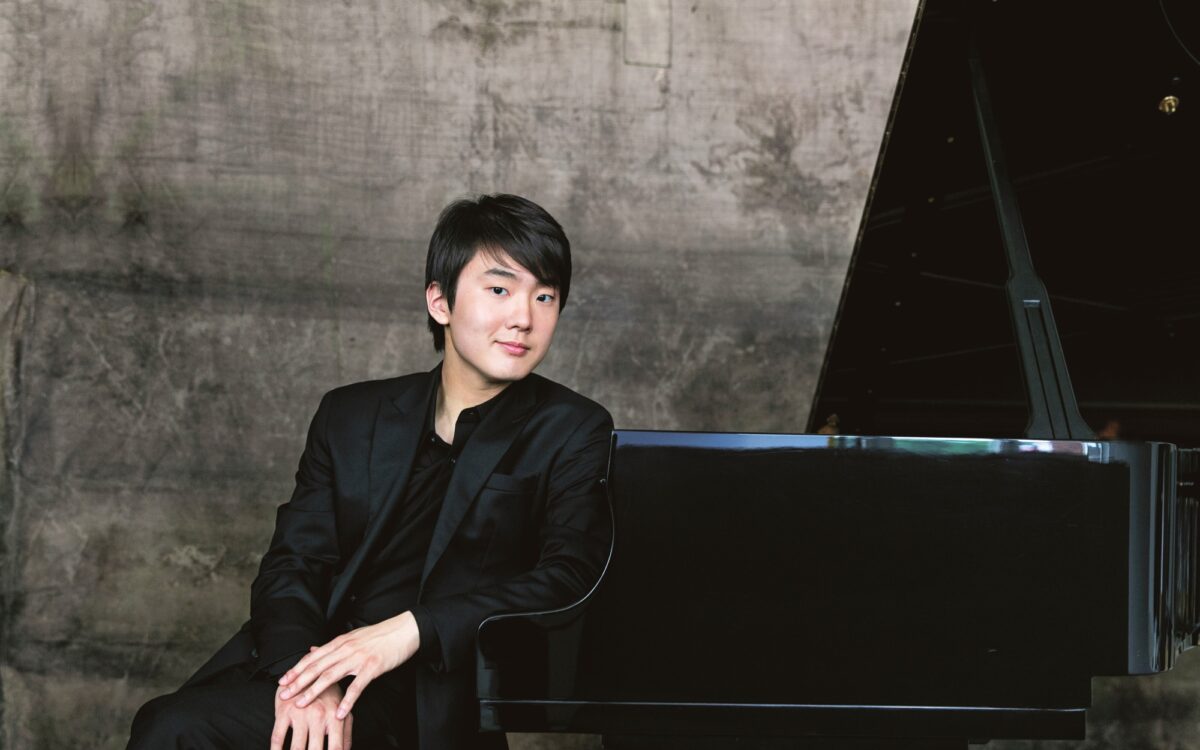Stride for orchestra
Composition and premiere: Tania León wrote Stride on commission as part of the New York Philharmonic’s “Project 19,” in which nineteen women were asked to compose works to mark the centennial, in 2020, of the ratification of the 19th Amendment to the U.S. Constitution, guaranteeing a woman’s right to vote. The piece was co-commissioned by the Oregon Symphony. Léon inscribed the score “In honor of Susan B. Anthony” and “Dedicated to the visionaries Deborah Borda and Jaap van Zweden”; Borda was at the time the Philharmonic’s President and CEO. Jaap van Zweden and the New York Philharmonic gave the world premiere performance on February 13, 2020, in Geffen Hall, New York City. First BSO performances: January 2024, Andris Nelsons conducting, at Symphony Hall in Boston and at New York’s Carnegie Hall. First Tanglewood performance: July 27, 2024, BSO, Andris Nelsons conducting.
At the time of its premiere by the New York Philharmonic, Tania León provided these comments on Stride:
When the New York Philharmonic reached out to me about writing for this project celebrating the 19th Amendment, I confess I only knew about it generally. I started doing research, reading Susan B. Anthony’s biography, her statements. It was tremendous to see the inner force that she had. Then I started looking for a title before starting the piece—not the way I usually do it. The word “stride” reflected how I imagined her way of not taking “no” for an answer. She kept pushing and pushing and moving forward, walking with firm steps until she got the whole thing done. That is precisely what I mean by Stride. Stride has some of what, to me, are American musical influences, or at least American musical connotations. For example, there is a section where you can hear the horns with the wa-wa plunger, reminiscent of Louis Armstrong, getting that growl. It doesn’t have to be indicative of any particular skin tone; it has to do with the American spirit. When I discovered American music, Louis Armstrong actually was the first sound that struck me. When I moved here, the only composers I knew anything about were Leonard Bernstein and George Gershwin. The night I arrived at Kennedy Airport, I was picked up by a Cuban couple from the Bronx, who allowed me to stay on their sofa. I looked at the stairs outside of their building, and I started crying “Maria!” They were confused, and I explained that in Cuba I’d heard the song by Leonard Bernstein. I later worked with Bernstein, and we were very close in his later years. When I first arrived here I couldn’t speak English…but I knew how to say “Maria.”
Tania León arrived in Leonard Bernstein’s, and the fictional Maria’s, New York in 1967, and through all her reputation’s expansion across the country and to Europe, the city has been the center of her musical world. The city and its people helped shape her life as an artist, and she, in return, has had a wide impact on the musical culture there. By design and by circumstance, Tania León’s orchestra work Stride is a coming-together of many byways and interests from throughout the composer’s life.
Stride’s connections to the New York Philharmonic go beyond the fact that that orchestra commissioned and premiered it. She dedicated the score to the Philharmonic’s then-music director Jaap van Zweden and its CEO, Deborah Borda. In 1993, during Borda’s previous leadership role with the orchestra, León had been named the Charles H. Revson Composer Fellow of the New York Philharmonic, working under Kurt Masur, but that position was essentially advisory, leading to no commissions or performances of her music. Stride could be seen as a long-awaited fulfillment of that role’s promise, and as if to amplify its impact, recently León was also named to the Philharmonic’s board of directors.
A few months after its first performances, in the midst of the pandemic, Stride was awarded the 2021 Pulitzer Prize for Music, American classical music’s most venerable honor. The following year she was recognized at the 45th Kennedy Center Honors alongside such pop-culture luminaries as U2, Gladys Knight, George Clooney, and Amy Grant. Last month she became the first female recipient of the SGAE Ibero-American Music Award, joining a list of composers including Leonardo Balada, Leo Brouwer, and Roberto Sierra.
These honors celebrate a professional career that has spanned, so far, some sixty rich, multidimensional years. Growing up in Havana, León had demonstrated musical talent that led her paternal grandmother to initiate what the composer called in an interview “the Tania project”—her family’s goal of providing her opportunity and expanding her horizons. Biographer Alejandro L. Madrid relates that she was given a toy piano as a child, and the family acquired a full upright piano for her and her brother when she was only 5, in spite of limited financial resources. Already interested in the Western classical music she heard on the radio, León attended a conservatory concurrently with her academic studies, and by her teenage years began attracting attention as a pianist, performing both familiar works and music by her colleagues, though rarely her own. She also naturally engaged with the varied Cuban folk and popular music and dance that she encountered in the city. After graduating in 1960, for practical reasons she earned a college degree in accounting and took a job in that field.
Meanwhile she continued to study and perform, giving her the experience she would need as a professional in New York even as she earned her master’s degree in composition at New York University, working with Ursula Mamlok. In 1969, just two years after her arrival in the U.S., León became the founding music director of Arthur Mitchell’s Dance Theatre of Harlem. As a conductor, León gained a lot of experience quickly; ten years later, she served a year-long stint as music director of the Broadway hit The Wiz. In 1978, she fulfilled an early dream of studying at the Boston Symphony Orchestra’s Tanglewood Music Center, where she joined the conducting seminar and worked with Seiji Ozawa and Leonard Bernstein, with whom she developed a warm friendship. Her return to Tanglewood this summer as a composer and as co-director of the Festival of Contemporary Music describes another circle of her life.
León has conducted orchestras and opera productions throughout Europe as well as in South America, Cuba, Africa, and Asia. Her expansive musical activities also include having served as a longtime member of the faculties of Brooklyn College and City University of New York. She has organized new music festivals and initiatives elevating the profiles of Latin American composers, all while composing for commissions from ensembles and festivals throughout the U.S. and Europe. Her opera Scourge of Hyacinths was commissioned for the Munich Biennale; other commissions include orchestral works for the Los Angeles Philharmonic, NDR Symphony Orchestra, American Composers Orchestra, and Cincinnati Symphony Orchestra, and works for Ensemble Modern and International Contemporary Ensemble, among others. Through the 2024-25 season, León is composer-in-residence with the London Philharmonic Orchestra. Andris Nelsons and the Boston Symphony Orchestra will premiere her new orchestra work Time to Time, a BSO commission, this September at Symphony Hall in Boston.
Stride’s score inscription in honor of Susan B. Anthony indirectly acknowledges the difficulties León faced being a composer and conductor in a field dominated by men (to name just one of the embedded obstacles she has had to overcome). León, though, prefers to deflect any categorization of her work as being, say, by a woman composer; by a Cuban composer; by a Black composer; even by an American composer. Many critics and assessors have found themselves tempted by a quick reading of her music to pigeonhole her voice, when in the end her inquisitive artistic personality has transformed every influence into something powerfully individual. That is the bigger point León makes as a curator and advocate—that every American composer, every composer from Cuba or Germany or Indonesia, whatever their influences, expresses an individual musical point of view. The great variety of stylistic voices represented in this weekend’s Festival of Contemporary Music bear this out.
León’s lifelong engagement with music for dance is palpable throughout her music. Related to this is her ear for instrumental timbres and her awareness of the physical requirements behind performing each instrument. In Stride, that physicality parallels the idea of unstoppable pushing-forward that León invokes with her title. Stride begins outside of time, without pulse, with strings in harmonics and pizzicato creating a sonic haze. The trumpets’ out-of-phase fanfares encourage percussion, and the piece begins to unfurl through an active interplay of contrasting orchestral colors. The composer has suggested that the narrative idea of different streams and densities of activity is a metaphor for human interaction in all its variety. A musical characteristic of many of León’s pieces, the effect is achieved both through very detailed notation and through brief pockets of incompletely defined, quasi-improvised fragments for individual players. Under this seemingly conflicting activity, a slow, undeniable, but sometimes irregular pulse is maintained, a tread of pizzicato double basses and sandblocks. This drives to a climax, after which, suspended again in time, we’re treated to brief virtuoso passages for contrabassoon, flutes, piccolo, oboes, percussion, violins. As a coda, the pizzicato bass-sandblock foundation returns along with the trumpet fanfares and bursts of percussion. Tubular bells have the last word, a jubilant tolling suggesting celebration—but not necessarily conclusion.
Composer and writer Robert Kirzinger is the Boston Symphony Orchestra’s Director of Program Publications.



